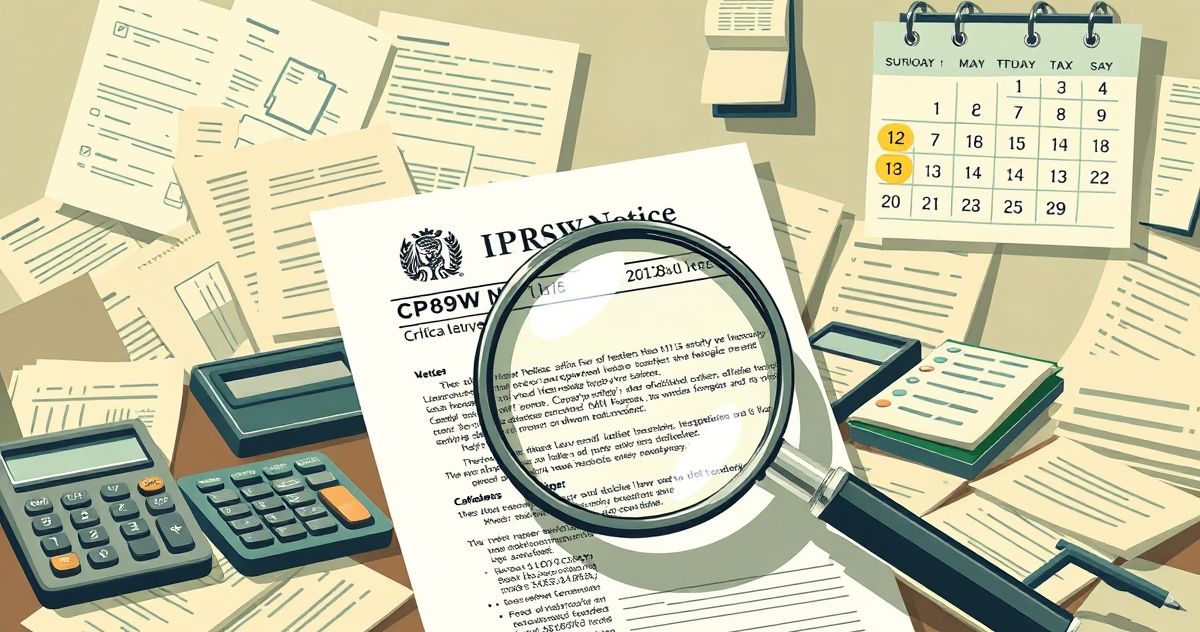Introduction to the CP89W Notice
The CP89W Notice is a critically important document issued by the Internal Revenue Service (IRS) that aims to inform taxpayers about significant changes made to their tax accounts. Such notices are generally dispatched following the IRS’s identification and correction of inconsistencies or errors in previously submitted tax returns. It contains detailed information regarding adjustments made, which may include recalculated refunds, additional tax owed, or rectifications to reported income or deductions. The CP89W Notice is a crucial component of a taxpayer’s interaction with the IRS, as failure to address its contents timely can lead to penalties.
What is the Primary Purpose of the CP89W Notice?
The fundamental purpose of the CP89W Notice is to ensure accountability and transparency in tax filings. By notifying taxpayers of adjustments, the IRS assists in maintaining accurate tax accounts. This not only ensures compliance with tax laws but also helps individuals avoid unexpected future liabilities. Such notices work as a feedback mechanism by alerting taxpayers to possible oversights, thereby preventing the recurrence of similar issues in future filings.
Key Features or Components
Explanation of Adjustments
The CP89W Notice explicitly outlines the specific changes made to a taxpayer’s account. Each modification is documented in detail, explaining the item adjusted and the justification for such an amendment. These alterations can cover a wide range of areas such as:
- Corrections to Reported Income: Differences between third-party data (like W-2s or 1099s) and the taxpayer’s submitted return.
- Credit Adjustments: Amendments to claimed credits, for instance, the Earned Income Credit or Child Tax Credit, may occur if documentation is lacking or eligibility criteria aren’t met.
- Deduction Recalculations: Corrections in deductions such as charitable contributions that need further substantiation or were initially miscalculated.
Impact on Refunds or Balances Due
The adjusted notice will explicitly communicate if the corrections result in a new balance due, a deduction in the expected refund, or an increase in the refund amount. Taxpayers will find:
- Revised Balance: Information about additional taxes owed, alongside a due date.
- Revised Refund: If the refund changes, the IRS may issue an additional amount or lessen the initial refund, depending on the situation.
- Interest and Penalties: Adjustments resulting in an underpayment could attract penalties and interest. The CP89W Notice will detail these charges and offer payment instructions.
Filing or Compliance Requirements
The CP89W Notice may necessitate actions from the taxpayer. Depending on the nature of the adjustment, the following responses may be required:
Payment Options
Taxpayers may have to settle any outstanding balance by a specified deadline. The IRS provides multiple payment options including online transactions, installment agreements, or checks by mail.
Filing Amendments
In scenarios where further corrections are needed beyond what’s addressed in the CP89W Notice, taxpayers might need to file an amended return to resolve additional discrepancies.
Penalties or Consequences for Non-Compliance
Ignoring the CP89W Notice can lead to serious consequences:
- Increased Penalties and Interest: Unresolved balances result in ongoing penalties and interest, which can exacerbate the taxpayer’s debt over time.
- Enforcement Actions: The IRS may initiate motions such as levies or liens if the taxpayer does not address outstanding announcements.
- Potential Audits: Repeated filing discrepancies or failure to respond to a CP89W Notice can raise the chance of an IRS audit in subsequent tax years.
The Importance of the CP89W Notice in Tax Resolution
The CP89W Notice plays a pivotal role in the management of tax accounts by identifying discrepancies that may result in increased balances, penalties, or adjustments. Rapid addressing of such notices can assist taxpayers in resolving possible tax debt issues efficiently, offering benefits such as:
Reduction in Penalties and Interest
Immediate resolution of discrepancies can reduce or even eliminate unforeseen penalties and interest accrual on the adjusted balance, aiding in effective tax debt management.
Prevention of Enforcement Actions
Proactively addressing any issues highlighted by the CP89W Notice reduces the likelihood of future enforcement activities by the IRS, like liens or levies.
Negotiating Repayment Options
Taxpayers facing new balances after adjustments may use the CP89W notice as leverage to discuss installment agreements, offer in compromise, or other tax debt resolution methods that fit their financial circumstances.
Conclusion
The CP89W Notice is essential not only for correcting past filing errors but also for acting as a preventive mechanism in accelerating tax debt resolution. Efficient management of this notice helps taxpayers by preventing the compounding of debts and enhancing their financial standing with the IRS. Ensuring timely compliance and engagement with this notice can facilitate a smoother journey towards financial responsibility and stability.

